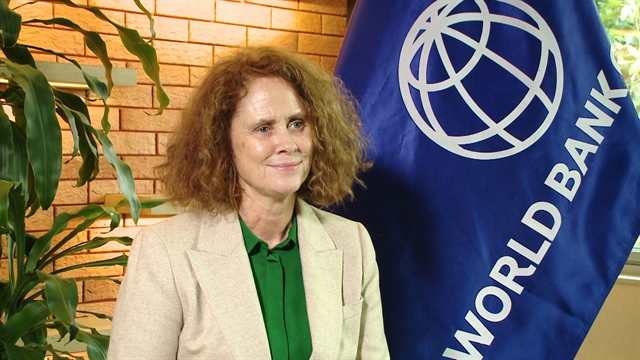 Opinion
Opinion


|
| World Bank Country Director for Việt Nam Carolyn Turk. —Photo chinhphu.vn |
HÀ NỘI — World Bank Country Director for Việt Nam Carolyn Turk has praised the Vietnamese government, especially the way it has handled the COVID-19 pandemic.
In a recent interview with the Việt Nam Government Portal, Turk congratulated the Government on its performance over the past five years, pointing out a number of ways it has succeeded.
Firstly, enabling the business environment and administrative reforms. In addition to investing in reforms aimed at opening up to trade and FDI, Việt Nam also implemented a series of procedures aimed at reducing the cost of doing business by streamlining bureaucracy for companies over the past few years.
Notably, the new Law on Enterprises took effect as of January 2021. The Government has cut 3,893 out of the total of 6,191 business conditions (accounting for 63 per cent).
In term of administrative reforms, Việt Nam has sped up the digital transition, with the roll out of various public services on the digital space, and the opening of the first ever national public services portal.
Noteworthy were the recent roll out of the digital databases for identifications, social security and land.
Secondly, macroeconomic management: Public debt fell to 55.3 per cent in 2020 from 63.7 per cent in 2016 – more than 8 per cent in four years. This reduction is unprecedented across the world and should be commended.
CPI was downed to 3.2 per cent compared to 7.65 per cent in the previous five year period.
Việt Nam was able to maintain macro-economic stability with average economic growth rate of more than 7 per cent for 2018 and 2019, and despite the COVID-19 pandemic, Việt Nam recorded growth of 2.9 per cent last year.
Thirdly, effective management of COVID-19 pandemic. The pandemic is unprecedented and many countries across the world are still struggling to contain it.
But Việt Nam has managed to keep the health impacts of the pandemic to minimum, thanks to a combination of quickly and strictly implemented policies, including travel restrictions locally and internationally, and aggressive find, test, trace and isolate (FTTI).
Despite the COVID-19 pandemic, the economy expanded, making Việt Nam one of the very few countries seeing growth.
These, and many other achievements, set a firm foundation for the next Government to start the implementation of the next five-year plan and 10-year strategy.
Asked about her recommendations for the next tenure, Turk said 2021 would be the first year Việt Nam starts the implementation of the 10-year strategy and five-year plan. The new Government is tasked with the implementation of this plan, which set the country on a trajectory to reach the goals of the 10-year strategy, and the vision for 2045 as set out recently by the country’s leaders.
To do so, new and stronger efforts should be placed on making the country more competitive, through a heavier focus on science, technology, and innovation agenda, according to the World Bank Country Director.
To become a high-income economy, Việt Nam will need to generate productivity gains through innovation, skills development and accelerating its digital transformation.
At this stage, Việt Nam’s access to higher education, as measured by the gross enrolment rate (GER), is below 30 per cent, one of the lowest among the East Asian countries, only half of Thailand and a third of the Republic of Korea.
Việt Nam also needs to address inefficiencies in its existing model of urbanisation and decentralisation, she added.
The country will need to address the remaining issues of ending extreme poverty in traditionally underserved ethnic minority communities (accounting for 86 per cent of all the poor), while coping with the challenges emerging from the growing and ageing middle class.
At the same time, Việt Nam remains one of the most vulnerable countries in the world to climate change, with high and rising levels of pollution (air, water), and is destroying its natural capital at an accelerating pace. The Southeast Asian nation is one of the five countries most affected by sea level rise, and about 12 million people in coastal provinces are exposed to the threat of intense flooding. Each year, an average of US$852 million – or 0.5 per cent of GDP – and 316,000 jobs in key economic sectors are at risk from riverine and coastal flooding. This could be another area of focus for the new Government.
And finally, Việt Nam needs to green and clean its growth, to make the country one worthy of living. Việt Nam reports one of the world’s highest CO2 emission per capita income, and Hà Nội is one of the cities with low air quality.
The World Bank, a long-term trusted partner of Việt Nam for the past 25 years, commits to continue supports to the new Government to achieve the country’s ambitions. — VNS




